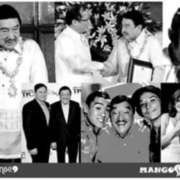We know the man and his characters that are continually rolling on the film reels of our collective memories. He made us cry, whimper, ponder, and above all–laugh. Going beyond the five senses, having a knack for humor is an integral trait of the Filipino and Rodolfo Vera Quizon Sr., aka “Dolphy” has given us lots of reasons, in his six decades of being in the entertainment industry, to laugh and not to take things so seriously.
Dolphy belongs to that amazing group of artists who made successful leaps in the various fields of art and entertainment (e.g. Honorata “Atang” dela Rama, National Artist for Theater and Music; and Pugo and Togo, among others). He started on the stage circa World War II where performances were very dangerous as bombs from the invading Japanese could turn the show into an explosive one. His forays in radio also marked the beginning of a long and fruitful partnership with the late Panchito Alba, another stalwart in Philippine Comedy. But it is with his portrayals of the Filipino “Everyman” that have endeared him to generations of Filipino audiences. His roles as the typical Pinoy father entrenched in the dire realities of being poor made evident in John en Marsha and Home Along Da Riles. These television shows explored the strife of those residing in the lower levels of society. Though they are underprivileged, the characters here are still able to squeeze out good-sized laughs despite being under dire circumstances. And above all, great attention was paid to the importance of family. Not to be forgotten are his marginalized characters in Facifica Falaypay, Ang Tatay Kong Nanay (directed by the late Lino Brocka, National Artist for Film), and Markova: Comfort Gay. These films tackled the conventions of how homosexuals are looked upon under such a conservative atmosphere. They were touching pieces, celebrating the diversity of individuals who are deserving of equal treatment.
Dolphy’s longevity and his willingness to take on challenging roles make him a great artist. His generosity in passing the wealth of lessons ripe with wisdom and wit endears him to fellow artists in the industry. Finally, it will be the viewing public– who laughed and cried with him on his films– who will be the final judge by keeping into their hearts, the oeuvre of his funny bones. More power and long live the King of Comedy!
(www.asianjournal.com)
(LA Midweek June 27, 2012 MDWK pg.6)






